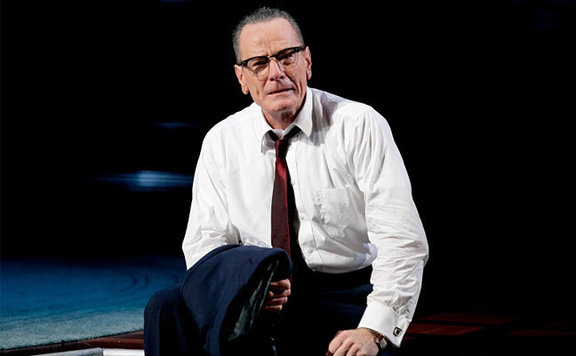LBJ Everywhere! Bryan Cranston as the President and More
By Patrick Sauer

Bryan Cranston as President Lyndon B. Johnson in Broadway's "All the Way." Photo by Evgenia Eliseeva courtesy of American Repertory Theater.
On March 31, 1968, Lyndon B. Johnson went on television and announced, “I shall not seek, and I will not accept, the nomination of my party for another term as your President.” Less than a year later, he would leave office. Four years after that, the thirty-sixth President of the United States would die of a heart attack at the age of sixty-four.
Although LBJ’s approval ratings never reached the lows of George W. Bush or Harry “22%!” Truman, he left office an unpopular and broken man, ultimately undone by the Vietnam War, which he never saw through to its muddling end.
Ten years after the fall of Saigon, I was in high school and distinctly remember the country’s historic reckoning and reconciliation process around the Vietnam War. The 1980s were awash in cultural appraisals, both high and low, including: Stanley’s Karnow’s benchmark Vietnam: A History (and its accompanying PBS series); the films "Platoon," "Full Metal Jacket," and "In Country"; and the TV show "Tour of Duty." Hell, the second highest-grossing movie of 1985 was the joyously jingoistic “we get to win this time” "Rambo: First Blood Part II."
The mood of the country had shifted. Soldiers were no longer pariahs, and the vicious Vietnam War battles of the 1960s were laid to rest at the base of Maya Lin’s brilliant Veterans Memorial -- except when it came to Johnson. For reasons right and wrong, the Vietnam War was his cross to bear. In the eighties, his major domestic legislative achievements were acknowledged, but the scars of Vietnam were still fresh enough to overshadow everything else. It seemed he would never live down the gruesome anti-war rhyme that defined his later years: “Hey, hey, LBJ. How many kids did you kill today?”
As another young stalwart of the anti-war movement once observed, the times, they are not static. Now, in 2014, LBJ’s time has come. He’s gone from a lost soul who left office in disgrace to the hottest topic in punditry and the bright lights of Broadway in this month's opening of "All the Way" (starring Walter White, no less!). As a presidential historian of remaindered note, I once ranked LBJ in the middle and said the Vietnam War “crippled his presidency and his legacy.” So what, exactly is a-changin’? Why now?
It’s not that LBJ is any different -- he’s been dead since Richard Nixon’s second term, after all -- but we are. According to Clay Risen, author of The Bill of the Century: The Epic Battle for the Civil Rights Act, available April 1, factors in play include our evolving perception over time. Next year will mark four decades since the end of the Vietnam War, the same number of years -- sit down Gen X-ers -- between World War II and 1985.
“I think Vietnam still hangs over him, at least among people old enough to remember, but among younger Americans, not so much. For them, I think he's more of a blank slate. It's so easy to overestimate historical memory, even among the most educated people,” Risen told me this week. “Aside from the icons -- Kennedy, Nixon, Reagan, maybe Clinton -- most people have no opinion whatsoever about past presidents.”
Critical views of Johnson’s foreign policy disasters have lessened with age, especially when seen through the dust of the last decade’s unpopular campaigns in Iraq and Afghanistan. With the stink of the jungle growing fainter every year, Johnson’s monumental domestic achievements have moved front and center. In comparison to our current president’s relationship with an utterly loathed, do-nothing Congress, his Big Texan legislative muscle seems especially enviable.
“There’s a general respect for Johnson’s legislative achievements, which are hitting their fiftieth anniversaries, but it doesn't hurt that he is being cast in contrast to Obama, who seems to be unable to force anything through Congress,” says Risen, an op-ed page editor at The New York Times. “LBJ was the right man at the right time. He benefited from Kennedy's assassination and subsequent sainthood, but that said, he pushed through things, like the War on Poverty, that went far beyond Kennedy's agenda. The Civil Rights Act was mostly in the bag, but the Voting Rights Act, Head Start, immigration reform -- these were things that Kennedy had only mused about, or had tried and failed to pass. Johnson’s list of signed legislation is voluminous.”
It makes sense that Johnson would be hot among editorial boards, but legislative policy wonks and dramatic theater buffs don’t exactly cross paths often (although Neil Patrick Harris as Lee Harvey Oswald in Sondheim’s Assassins came close). So what other modern force brought Johnson to Broadway?
Robert Caro. His four-book (and counting) history of LBJ has cemented its place in the modern pantheon of presidential histories alongside titles such as David McCullough’s Truman and Edmund Morris’s Teddy Roosevelt trilogy. The renowned biographer’s choice to devote so much of his life’s work to Johnson’s career has helped bolster the president’s reputation, and the twenty-first century publication of his last two legislation-centric books -- Master of the Senate and The Passage of Power -- have delivered a new audience to LBJ’s progressive accomplishments. Since more people are likely to participate in the LBJ renaissance with Bryan Cranston at the Neil Simon Theater than through Caro’s 3,000-plus page canon, I guess there’s only one question left to ask:
Hey, hey, LBJ. How many seats did you fill today?
